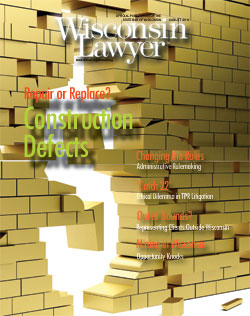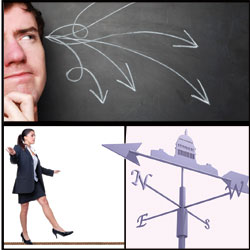Sneak peek: Economic waste doctrine and changes to administrative rulemaking highlight August Wisconsin Lawyer
 Aug. 9, 2011 – New home construction doesn't always go as planned. In the August Wisconsin Lawyer, now available online and in mailboxes soon, a construction litigator explains how courts deal with construction defects under the economic waste doctrine.
Aug. 9, 2011 – New home construction doesn't always go as planned. In the August Wisconsin Lawyer, now available online and in mailboxes soon, a construction litigator explains how courts deal with construction defects under the economic waste doctrine.
Under the economic waste doctrine, courts may impose damages for construction defects based on the difference between value as constructed and value constructed properly. This may leave homeowners without money to repair defects in accordance with their wishes.
Homeowners can minimize the risk that a court will apply the economic waste doctrine to limit recovery for defects in construction, Mark Hinkston explains in his article “Repair or Replace: The Economic Waste Doctrine in Construction Defect Cases.” On the flip side, Hinkston notes the practical implications of the doctrine for contractors.
In his article “Changing the Rules on Rulemaking,” former Wisconsin Legislative Counsel attorney Ronald Sklansky explains the major changes to Wisconsin’s administrative rulemaking process under 2011 Wisconsin Act 21, which took effect on June 8, 2011.
“As a consequence of the Act’s amendments to the rulemaking process, new avenues have been created for an interested party to affect the final outcome of a properly promulgated administrative rule,” Sklanski notes.
 And while Milwaukee County Circuit Court Judge Christopher Foley explains how termination of parental rights cases can create an ethical dilemma for defense counsel who cannot locate or contact the client, ethics gurus Tim Pierce and Dean Dietrich provide some guidance.
And while Milwaukee County Circuit Court Judge Christopher Foley explains how termination of parental rights cases can create an ethical dilemma for defense counsel who cannot locate or contact the client, ethics gurus Tim Pierce and Dean Dietrich provide some guidance.
“The lawyer should carefully and diligently pursue communication with the client and document the client’s failure to respond to communication or requests for information from the lawyer,” they write in a sidebar to Judge Foley’s article.
Read why part-time assistant district attorneys are barred from also working as a private practitioners in Formal Opinion EF-11-02, issued July 5, 2011. In addition, Dietrich explains, in his monthly ethics column, when it’s okay to for a Wisconsin-licensed attorney to provide legal services on an occasional basis in a state in which the lawyer is not licensed.
Don’t miss the second of a two-part article on women lawyers and the work-life balancing act by attorney Michael Moore, a lawyer and a professional coach for lawyers. In it, Moore explains that women lawyers leave law firms at double the rate of men, and “[l]aw firms that fail to provide better working environments will continue to lose both cash and talented lawyers.”
In his monthly “President’s Message,” State Bar of Wisconsin President James Brennan talks about the future of mining in Wisconsin and the opportunities for lawyers to get involved. And State Bar Executive Director George Brown explains what the State Bar is doing to help lawyers start their own practices in his monthly column, “Inside the Bar.”
